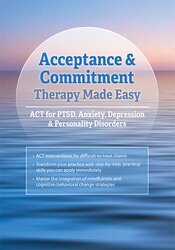

Are your current techniques just not working?
You’ve experienced the frustration; you have a client who seems to just not break through. You’ve tried your best, but the outcome is the same: he or she progresses for a while, then regresses again.
Acceptance and Commitment Therapy is the popular transdiagnostic approach that you can integrate into your practice to achieve positive therapeutic outcomes with difficult-to-treat clients.
Watch ACT expert and presenter Daniel J. Moran, in this recording as he delivers an exercise- and intervention-heavy course that will give you the tools you need to more effectively treat clients with PTSD, anxiety, depression or personality disorders.
You’ll learn how ACT weaves mindfulness strategies with cognitive-behavioural change strategies to revolutionize client outcomes, as well as discover a variety of ACT techniques for helping clients who are struggling to make difficult behaviour changes due to the presence of painful thoughts, feelings and memories.
By shifting focus to their own values, ACT sets clients up to embrace behaviour change that is meaningful to them while simultaneously fostering skills that allow clients to more effectively handle impulsive actions based on current thoughts or emotions.
Purchase this recording today, and Dr. Moran will guide you step-by-step through highly practical, evidence-based ACT skills that you can apply in your practice immediately!
| File type | File name | Number of pages | |
|---|---|---|---|
| Manual - Acceptance & Commitment Therapy Made Easy (2.00 MB) | 34 Pages | Available after Purchase | |
| Manual for Part 2: ACT for PTSD, Anxiety, Depression & Personality Disorders - French (2.00 MB) | 34 Pages | Available after Purchase | |
| Manual for Part 2: ACT for PTSD, Anxiety, Depression & Personality Disorders - Italian (2.00 MB) | 34 Pages | Available after Purchase |

Daniel J. Moran, PhD, BCBA-D, is the former president of the Association for Contextual Behavioral Science (ACBS), the international ACT organization with over 8,000 members worldwide. He co-authored the first case conceptualization manual for Acceptance and Commitment Therapy entitled ACT in Practice (New Harbinger) and served on the first ACT training committee.
As a recognized ACT trainer in the ACBS community, Dr. Moran has an engaging training style that has led him to be an invited keynote speaker for many events in the last decade. He has also been featured on The Oprah Winfrey Network, TLC, and The Discovery Channel discussing the treatment of many clinical disorders and has published several articles and book chapters, including publications with CBT pioneer Albert Ellis and ACT pioneer Steven Hayes.
Dr. Moran founded the MidAmerican Psychological Institute, a clinic in Chicagoland, and continues to supervise therapists and treat patients in that organization. His passion is for applying the ACT principles in important areas outside of the clinic, such as the boardroom or construction sites. He established Pickslyde Consulting in order to bring mindfulness and value-directed commitment skills to the workplace in order to improve safety, innovation and leadership. Dr. Moran has utilized ACT in work implementations and clinical training sites on six continents and in all 50 of the United States.
|
Acceptance & Commitment Therapy Made Easy: ACT for PTSD, Anxiety, Depression & Personality Disorders
Copyright: 03/05/2022 - Product Code POS047880 |
The ACT Model
Components of the ACT Model
Acceptance: Foster Client Acceptance of Emotions to Increase Values-Based Action
Defusion: Change the Way Clients Interact with Their Thoughts
Self-As-Context: Aid Clients in Establishing Their Identities
Contact with the Present Moment: Strategies to Build Attention to the Here & Now
Values: Aid Clients in Deciding What Gives Live Meaning
Committed Action: Assist Clients in Behaving in the Service of Chosen Values
ACT in Action
PTSD
Anxiety
Depression
Personality Disorders
Please wait ...